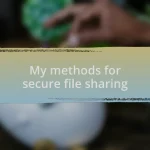Key takeaways:
- Effective password management is essential for protecting personal information, utilizing tools like password managers and two-factor authentication for enhanced security.
- Creating strong, unique passwords is vital; avoiding common mistakes, such as password reuse and relying on easily guessable passwords, can significantly reduce security risks.
- Teaching children about password security through relatable examples and active involvement fosters a better understanding of the importance of maintaining privacy online.
- Regularly updating passwords and using memorable phrases can simplify password management while enhancing security.
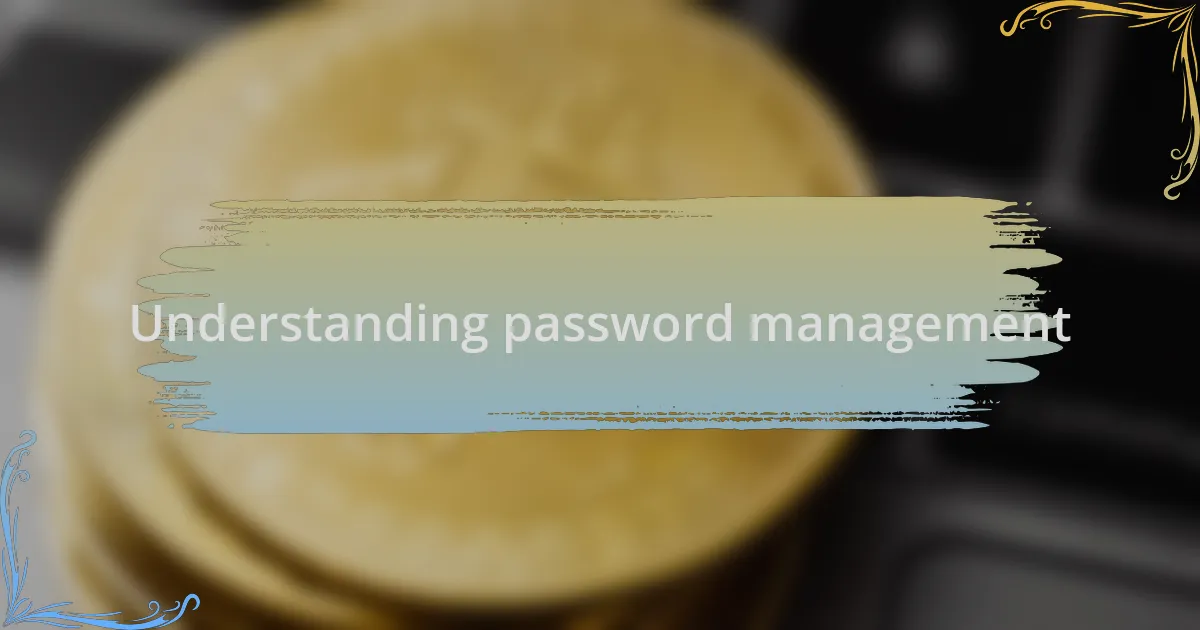
Understanding password management
Proper password management is crucial in today’s digital landscape. I remember the first time I lost access to an account because I couldn’t recall a complex password I’d created. It was frustrating and taught me early on the importance of not only creating strong passwords but also keeping them organized and accessible.
Think about it: how many different accounts do you have? I often find myself juggling several passwords for various websites and apps, and it can get overwhelming. That’s why I started using a password manager. It not only simplifies storing passwords but also generates strong ones that enhance my security without the headache of memorization.
Understanding password management also means recognizing when to change your passwords, especially after potential breaches. I’ve been in situations where I received emails indicating that my data might be compromised. Those moments are nerve-wracking, and they remind me why investing time in password management is essential for protecting my personal information online.
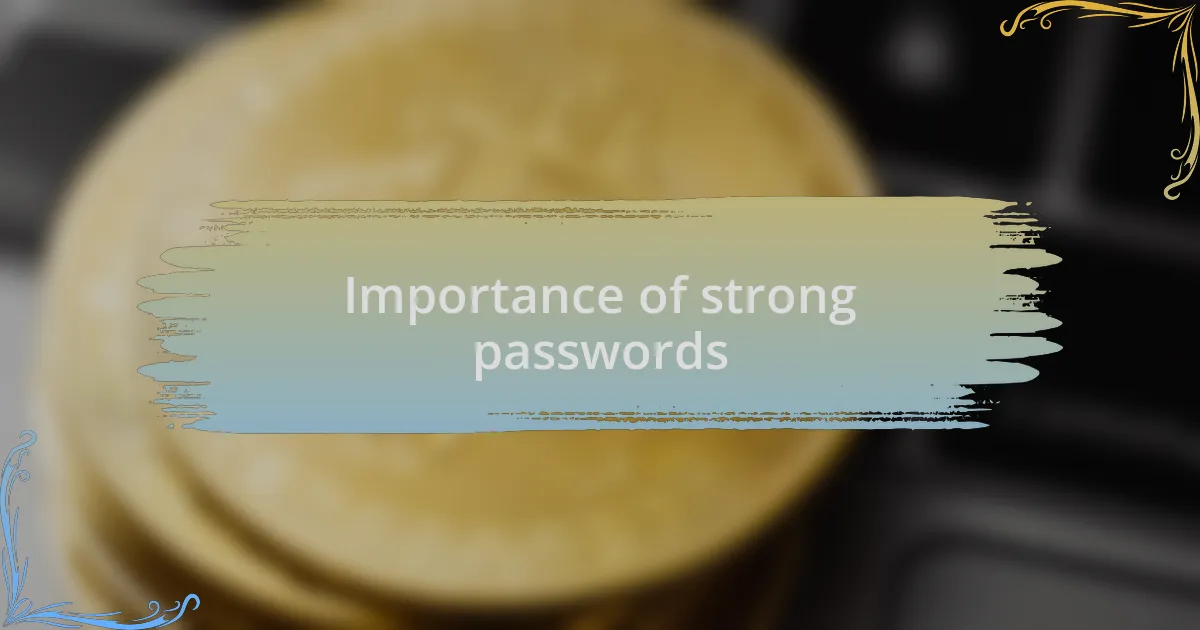
Importance of strong passwords
Creating strong passwords is fundamental to safeguarding your online presence. I still remember the anxiety I felt when I received a notification that someone attempted to access my account. It made me realize how a weak password can act like leaving your front door wide open. Strong passwords are much like a sturdy lock; they deter unauthorized access and keep your information secure.
I’ve also learned that using a combination of letters, numbers, and symbols significantly boosts password strength. When I first experimented with making my passwords more complex, it felt like an extra chore. However, over time, I understood that these little extra steps were vital in shielding my accounts. Isn’t it a relief to know that such a simple change could drastically reduce the risk of being hacked?
Moreover, I’ve come to appreciate the peace of mind that comes with robust passwords. There’s a level of confidence that follows knowing I’ve taken proactive measures to protect my private information. When I successfully set up two-factor authentication alongside my passwords, it felt like installing an additional security system for my accounts. Don’t you think it’s worth the effort to create strong passwords and enjoy such peace of mind?
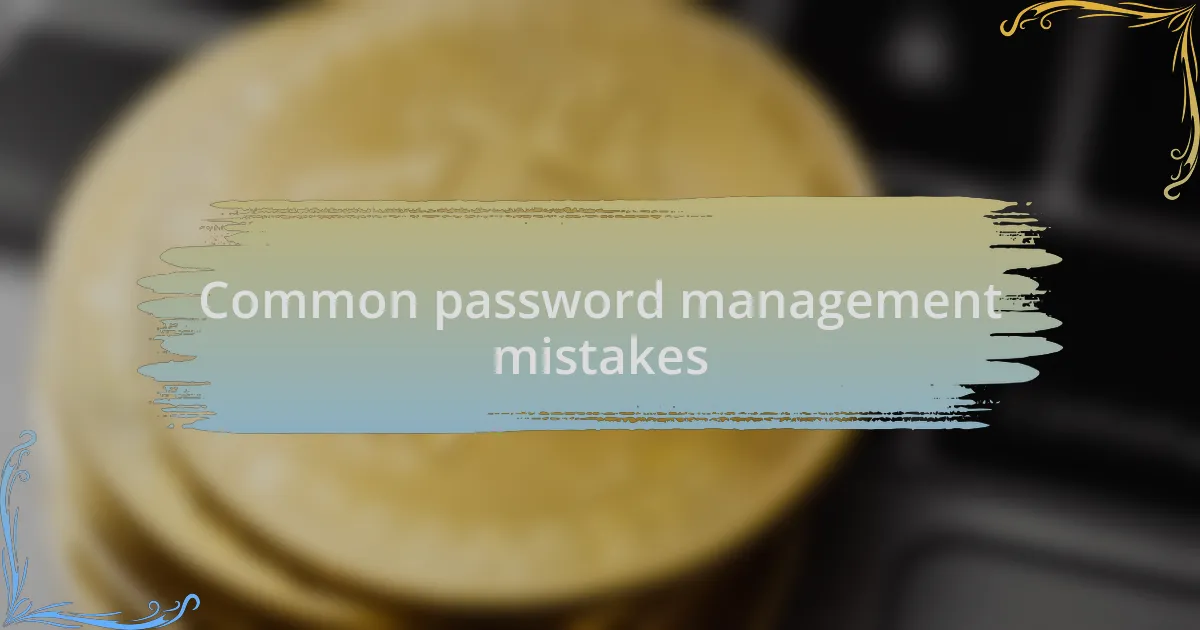
Common password management mistakes
One common mistake I’ve seen often is relying on easily guessable passwords, like “123456” or “password.” I once encountered an old friend who used his pet’s name as a password, thinking it was cute and memorable. Unfortunately, I had to gently remind him that even a little creativity could be a game changer; something simple can be too easy for a hacker to crack.
Another pitfall is reusing passwords across multiple sites, as I learned the hard way when a breach at one service compromised my accounts elsewhere. It felt like a punch in the gut when I discovered that my favorite online store’s hack put my social media and banking accounts at risk too. Why take that gamble when using a password manager can help generate and store unique passwords for each service?
Lastly, I’ve often stumbled upon the mistake of not updating passwords regularly. There was once a time when I kept the same password for far too long simply out of convenience. After realizing that outdated passwords are like leaving your windows unlocked, I made it a routine to update them periodically. Isn’t it better to take a few moments now to ensure your accounts remain secure?
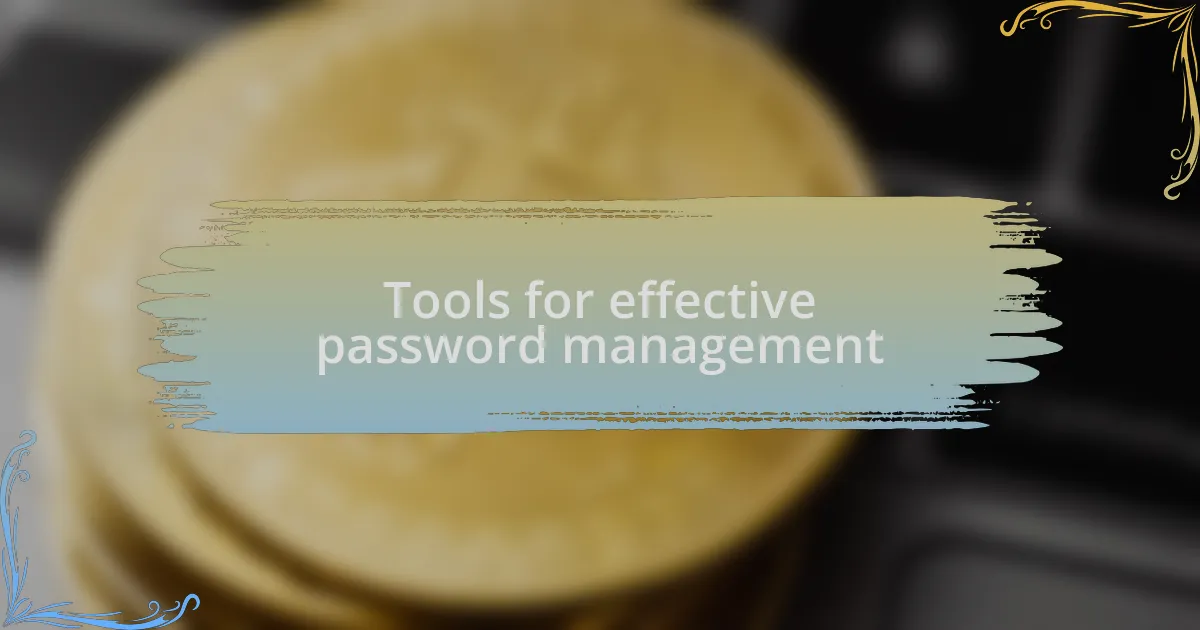
Tools for effective password management
When it comes to effective password management, using a reliable password manager can be a game changer. I remember the first time I tried one—suddenly, my memory was freed from the burden of retaining countless passwords. It felt like losing a backpack full of heavy stones. Wouldn’t it be nice if we could all feel that lightness?
Another tool that’s proven invaluable in my experience is two-factor authentication (2FA). I can’t stress enough how much peace of mind it gives me. After setting it up, I realized it’s like having a second lock on my door; even if someone had my password, they’d still need that extra code. It’s a simple yet powerful layer of security that any kid using online platforms should embrace.
Lastly, consider using secure note-taking applications to store sensitive information securely. I once lost access to critical accounts simply because I had forgotten recovery questions. Now, I document vital information in an encrypted note, safeguarding it against unauthorized access. Have you ever considered how easily you could access that info if you had a reliable system in place?
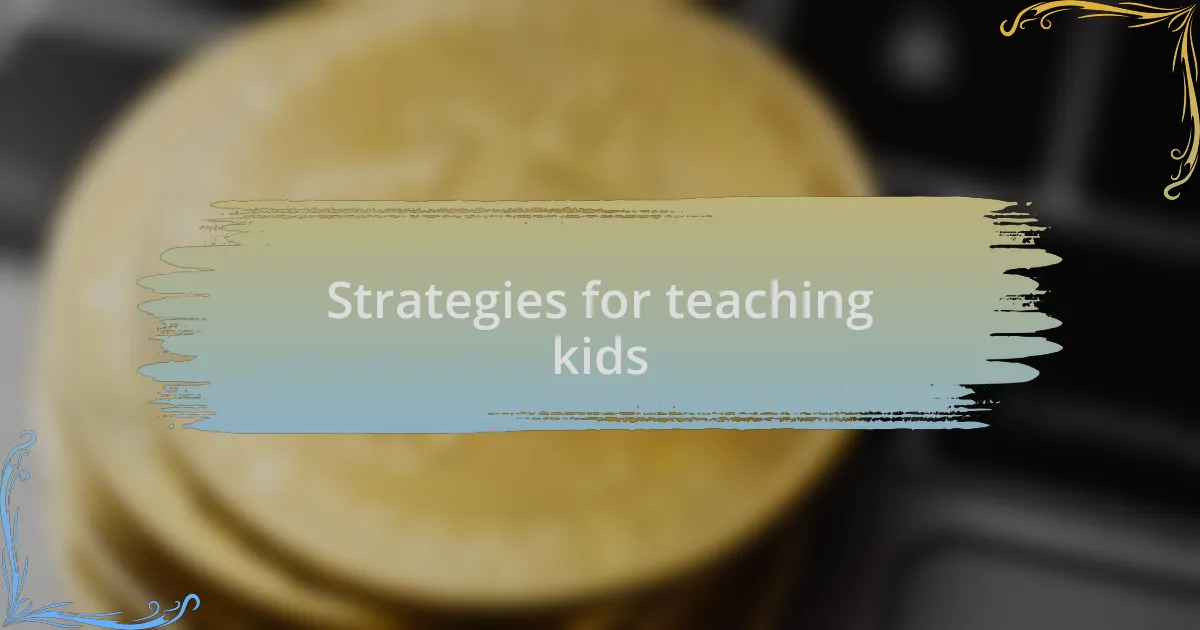
Strategies for teaching kids
When teaching kids about password management, I find that using relatable examples makes all the difference. For instance, I often explain passwords like a secret code that protects their favorite toys—something they naturally want to keep safe. This analogy not only grabs their attention but helps them understand the importance of creating strong, unique passwords.
Another technique I’ve used is involving them in the process of creating passwords. Together, we brainstorm phrases or hobbies they love and convert those into memorable passwords. For instance, if a child loves dinosaurs, a phrase like “RexRules123!” could work. Isn’t it amazing how personalizing the process can make it not only educational but also fun?
Lastly, I’ve found role-playing scenarios incredibly effective. I ask them to imagine a friend asking for their password and discuss how they’d feel about sharing it. This exercise really helps them grasp the emotional weight of password sharing and reinforces the need for good security habits. By putting themselves in that situation, they start to understand the concept of privacy and why it matters.
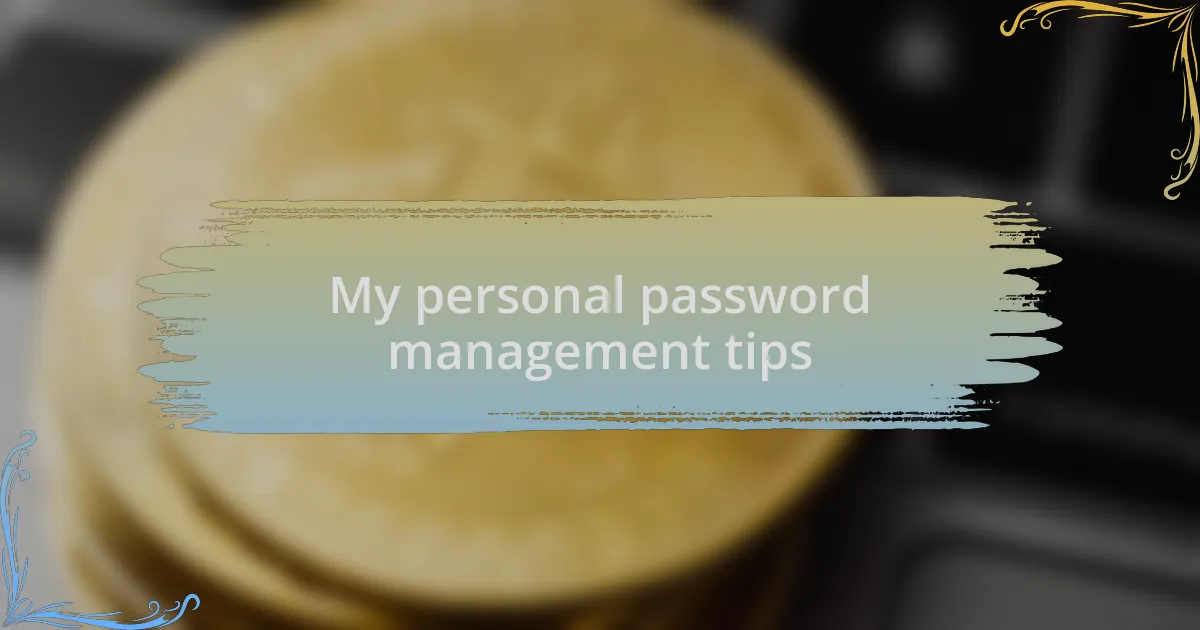
My personal password management tips
When it comes to password management, my top tip is to create a system that keeps things simple yet secure. I use a memorable phrase as a base; for example, when I made a password for a new game account, I combined my favorite childhood cartoon with the year I first watched it. The result? A password that’s both personal and strong. Have you ever noticed how the things that make us happy can also help us remember vital information?
I also remind myself to change my passwords regularly. It might feel like a hassle, but I treat it like changing the locks on my door after someone loses a key. Once, after reading about a data breach, I was spurred into action and changed all my important passwords in the same day. It felt empowering, knowing I was taking control of my digital safety. How often do we really take that step to ensure our online presence is secure?
Lastly, I encourage using a password manager for those complex passwords I just can’t memorize. It’s like having a digital vault where I store my secrets, and I no longer feel overwhelmed by all the combinations. When I first started using one, I wondered how I ever managed without it. It not only eases my mind but also lets me focus on the things I enjoy instead of stressing over remembering every single password.
